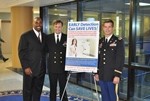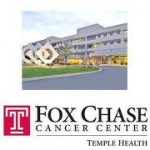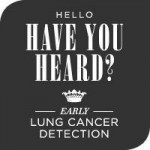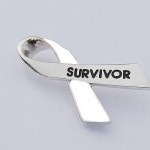Lung Cancer Awareness Month – Walter Reed Bethesda Begins Lung Cancer Screening
Saturday, November 10th, 2012 Walter Reed National Military Medical Center (WRNMMC) will provide lung cancer risk assessments for veterans and military beneficiaries beginning today during a Lung Cancer Screening and Awareness Day.
Walter Reed National Military Medical Center (WRNMMC) will provide lung cancer risk assessments for veterans and military beneficiaries beginning today during a Lung Cancer Screening and Awareness Day.
All military beneficiaries and District of Columba Veterans Affairs (VA) veterans may participate in the screening at WRNMMC today from 8 a.m. to 5 p.m. at the Internal Medicine clinic located in the America Building, first floor, according to Lt. Cmdr. Corey A. Carter, of Hematology-Oncology at Walter Reed Bethesda.
“The event is just the kick-off,” Carter added. “Screening will be performed every day, just like mammograms are performed every day.”
“This important new lung cancer screening program for military and veterans at high risk has the potential to save lives and decrease death from lung cancer,” said Army Col. (Dr.) Craig Shriver, chief of General Surgery Service and interim director of the U. S. Military Cancer Institute at WRNMMC. “The Cancer Center at Walter Reed Bethesda is proud to be the first military medical center to offer this unique program to our beneficiaries.”
The screening is being held in conjunction with Lung Cancer Awareness Month, observed annually during November. The observance began as Lung Cancer Awareness Day in 1995, and expanded to a month-long observance in order to draw greater attention to the leading cause of cancer deaths in men and women in the U.S., according to the American Lung Association.
Annually, approximately 200,000 people in the U.S. are diagnosed with lung cancer, and more than 150,000 people die from this disease, according to the Centers for Disease Control and Prevention (CDC). Deaths from lung cancer represent about one out of every six deaths from cancer in the U.S., according to the CDC. The CDC cites smoking causes 80 to 90 percent of cases of lung cancer.
Carter explained the purpose for the lung cancer screening is for a 20 percent reduction in lung cancer death. Veterans may be among those with the highest risk for lung cancer, he added. “Smoking is the biggest risk factor. Added to this, many of our veterans were exposed to Agent Orange, [in addition to] occupational exposure to jet and diesel fuel,” Carter said.
At Walter Reed Bethesda, the lung cancer screening will include an evaluation to verify a patient is at high risk for the disease, Carter explained. Those at risk will be enrolled into a screening program that will conduct annual low dose chest CT scans, he added.
Carter said the five-year survival rate for a person diagnosed with lung cancer is 15 percent. “We are hoping to diagnose lung cancer earlier, at a curable stage.”
He added it’s important people understand their risk factors for lung cancer. According to the CDC, lung cancer risk factors include:
- Smoking
- Secondhand smoke from other people’s cigarettes
- Radon gas in the home
- Things around the home or work that, include asbestos, ionizing radiation, and other cancer-causing substances
- Medical radiation exposure to the chest
- Chronic lung disease such as emphysema or chronic bronchitis
- Increased age
Carter went on to note people should understand the risk factors, and get screened. “We will offer an appointment with a medical home team member to screen all of our beneficiaries for risk factors and determine if they would benefit from screening.
“Walter Reed Bethesda is leading the nation by forming a multidisciplinary screening program and will offer it to our high risk patients,” Carter added.
According to the CDC, not everyone has the same symptoms for lung cancer.”Some people don’t have any symptoms at all when first diagnosed with lung cancer. Lung cancer symptoms may include:
- Shortness of breath
- Coughing that doesn’t go away
- Wheezing
- Coughing up blood
- Chest pain
- Repeated respiratory infections such as bronchitis or pneumonia
These symptoms can happen with other illnesses, which is why Carter encourages veterans and beneficiaries to participate in the screening beginning Nov. 8.
The CDC also states people can reduce their risk of developing lung cancer in several ways, including the following:
- Don’t smoke. If you do smoke, quit now
- Avoid secondhand smoke
- Have your home tested for radon and take corrective actions if high levels are found
- Be aware of your exposure to radiation from medical imaging. Ask your doctor about the need for medical tests that involve images of the chest.
- Follow health and safety guidelines in the workplace when working with toxic materials.- Avoid diesel exhaust and other harmful air pollutants.
Lt. Commander Corey A. Carter, Walter Reed National Military Hospital from TEAM DRAFT on Vimeo.







